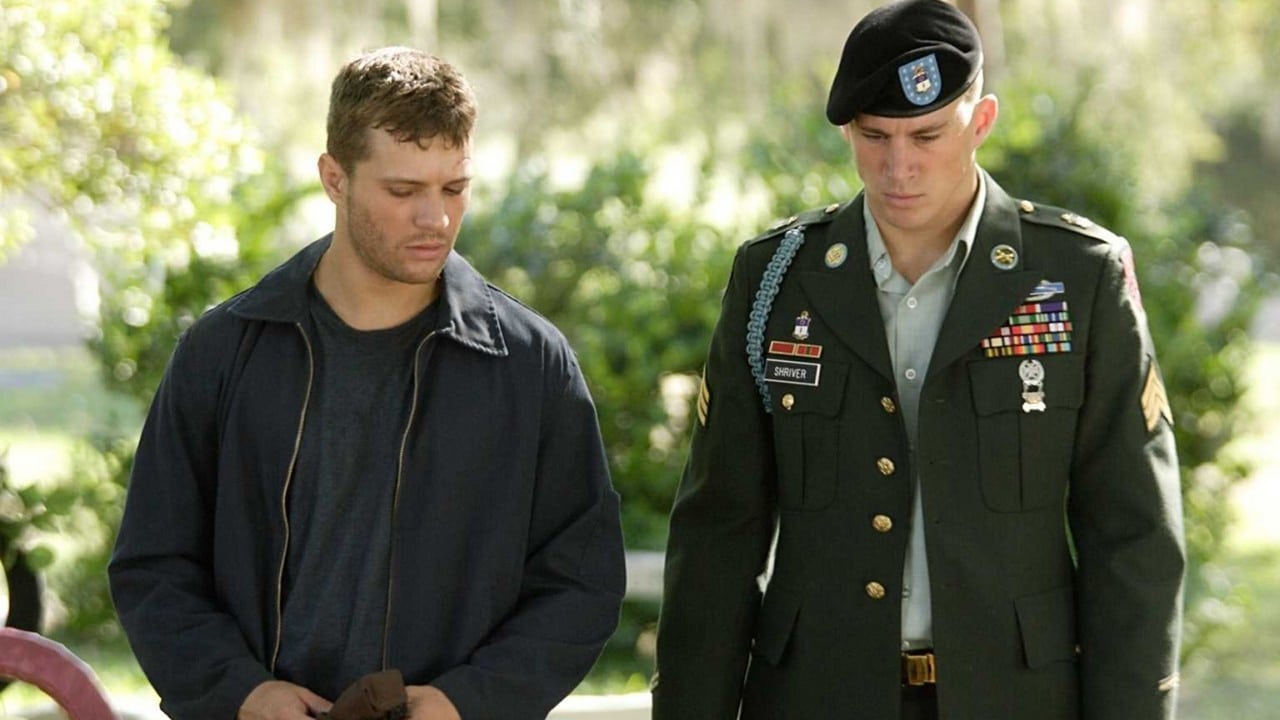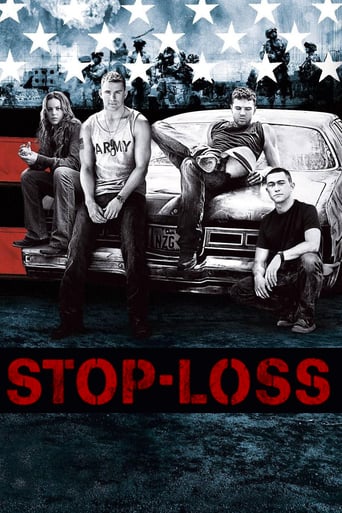

The Worst Film Ever
... View MorePeople are voting emotionally.
... View MoreIt was OK. I don't see why everyone loves it so much. It wasn't very smart or deep or well-directed.
... View MoreA film of deceptively outspoken contemporary relevance, this is cinema at its most alert, alarming and alive.
... View MoreBrandon King (Ryan Phillippe) and his men get caught in an ambush in Tikrit, Iraq. Several are killed in the incident. King returns home to Texas as a hero. Senator Orton Worrell promises to care for his injured comrade Rodriguez. His friend Steve Shriver (Channing Tatum) shows signs of PTSD scaring his fiancée Michelle (Abbie Cornish). Tommy Burgess (Joseph Gordon-Levitt) is drunk and gets thrown out by his wife. Brandon, Tommy and Steve report back to the military. Brandon is surprised to be stop-loss. He is ordered back to Iraq despite expecting to be discharged. He goes AWOL. Along with Michelle, he heads for D.C. to get help from Senator Worrell.There are a few interesting performances but the movie takes on too much. It needs more scenes of quiet character development and concentrate on fewer people. Not everything has to be issues about being a soldier. It pushes a little too hard when King goes super-soldier on those thieves. There's probably a better and simpler movie in here.
... View MoreObjectively as a person who reviews thousands of films, I have to say this was a terrible movie.On the one hand, while I knew about stop loss already as everyone who signs the dotted line does, I found it to be unconstitutional as a concept.On the other hand, this movie was pure propaganda from bleeding hearts. It has the clichés running straight through it from start to finish, and it wouldn't have been so bad if the directing, script, dialog were any good.I think the actors did a decent job with what they had to work with, and there were some intriguing ideas, but they weren't new ones and they weren't done skillfully.In the end we wonder what he learned if anything from his actions. It seems it was all full of sound and fury signifying nothing.If you want to see my favorite movie about war, watch The Deer Hunter. Now that's a movie that will change your life.
... View MoreBy definition, Stop-Loss is an order issued by the United States that would extend one's time in action after their time serving is done during times of war. This movie is a powerful, tragic look on the trauma soldiers face after leaving the action. We see how these lives are far from normal and how war not only personally affects them, but the lives around them. This film may be seen to have a political agenda, but then again the Iraqi war was all just for political nonsense in the first place.Kimberly Peirce's film is about a U.S Army Staff Sergeant named Brandon who becomes traumatized along with this two friends back home after he accidentally killed innocent people overseas. While thinking he is home for good, he realizes that he is going to be sent back despite his resistance.This film is well-acted and is full of rising stars. Ryan Phillippe does a good job as Brandon and he makes us sympathize for him and practically every soldier on he job. Channing Tatum is pretty good even though I felt he seemed a little wooden and moody. Joseph Gordon-Levitt is my favorite actor in this movie and I wish I saw more of him in the movie.Overall, this is a powerful take on what war will do to you and how it will change you. This is a film about today's generation of wars and how powerful they have become. Like it or not, the United States was in a war for no reason and despite all the bravery, these young men were dying for no reason. That is what the message of the film is. It's an underrated, but vastly powerful film. I rate this film 9/10.
... View MoreThis film is never going to make money in the USA because all films and politicians have to make Amnericans feel good about themselves. This leaves one with the queasy feeling that not all is well - the US might not be doing the best thing by the Iraqis, after all whose country is it? Who invaded whom? And under what pretext? But the film is in favour of all those guys fighting on the ground, but they may be fighting the wrong war in the wrong place - and to conservative US that is not acceptable. So this film divides opinion. 'Hurt Locker' of course portrays US heroes so is going to be far more acceptable. The film has a fifties/forties feel in that a decent man makes one mistake, and becomes a fugitive. Montgomery Clift would have made this then. The film portrays a good man caught by duty and his own feelings of justice - a classic theme - well played by Ryan Phillippe, who does manage to show a good range of emotions, and who doesn't get the comfort of getting the girl into the sack - that was left for real life! The script shows the strain of loyalties and the effects of killing in a war that the West brought down upon a largely civilian population - sounds like Concord and 1776 to me! The supports act well and do not drown out the main action and character. But the film has a problem in that the spur for the action is played down too much - eg Brandon King refusing to be 'stop lossed' - and it does not want to make events too dramatic (something the more visceral 'Hurt Locker' engages). Therefore, the film tends to meander as it tries to be too understated. But it does get in several wry observations about an immigrant army, a creepy, smiling officer class, and promise all politicians. A good effort, but ultimately it gets caught between too many stools. A pity because the acting deserved more recognition than being tarred by the rabid, blind patriotism of Americans who see an anti-war and anti-US film!
... View More